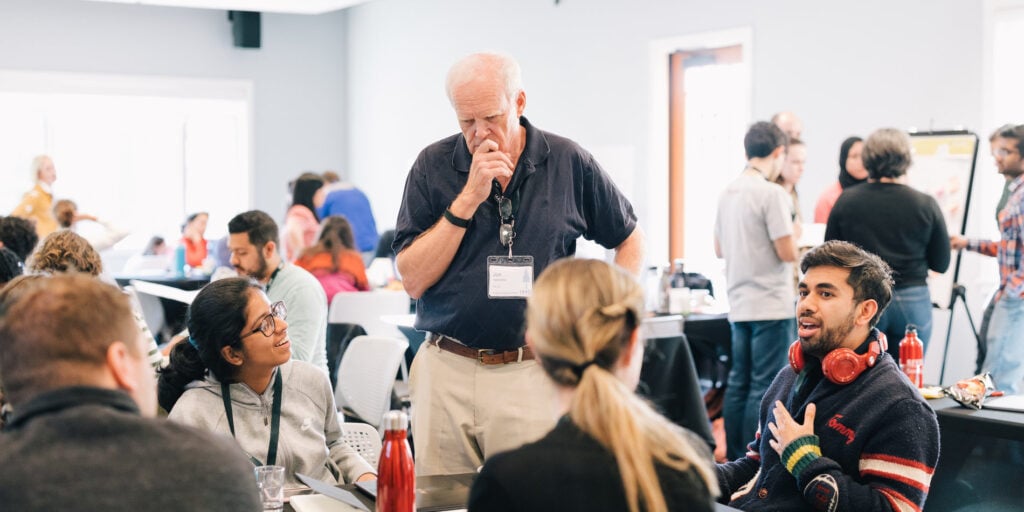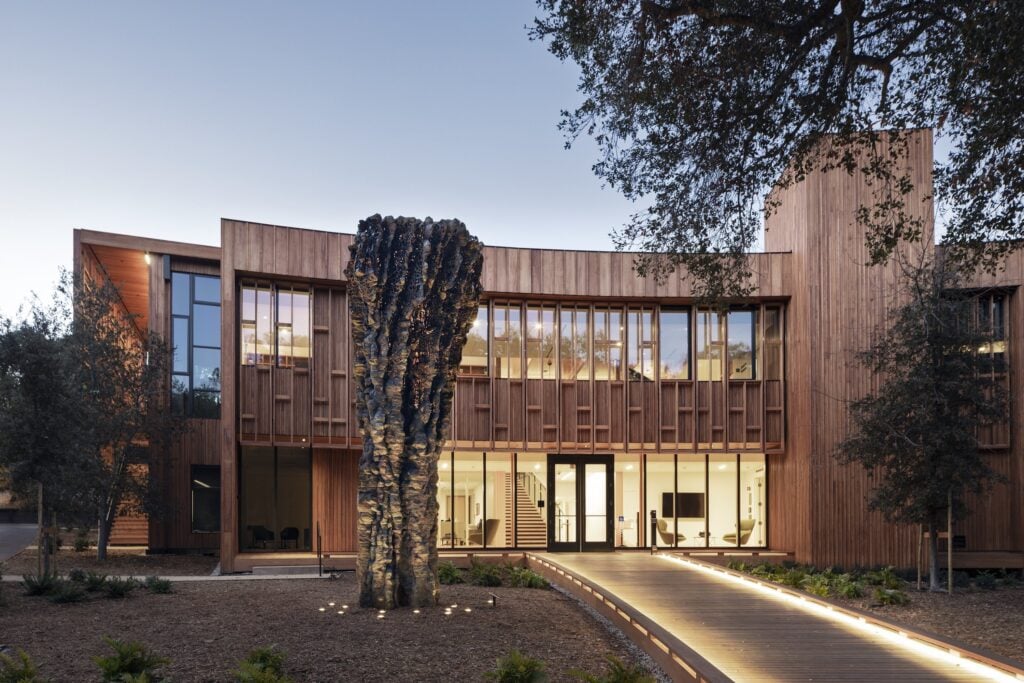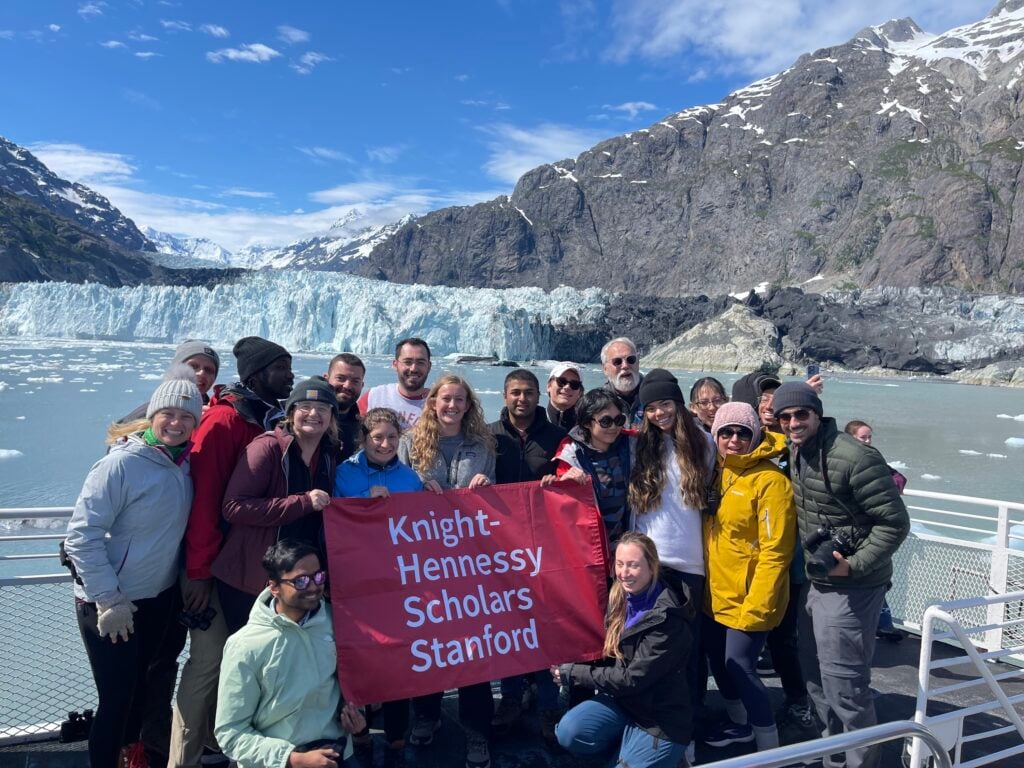Knight-Hennessy Scholars (KHS) is a unique and highly selective scholarship program for students pursuing graduate degrees at Stanford University. The program fosters a model of forward-thinking leadership among participants as part of the wide-ranging graduate education they’re pursuing at Stanford. The goal is to educate a new generation of global leaders.
The program not only pays for successful applicants’ graduate degrees, it also aims to build up a community of scholars to collaborate on impactful multidisciplinary projects. Scholars participate in an extensive leadership development program alongside their degree programs, as well as attending additional KHS events.
The funding, learning, and networking opportunities offered by KHS make it a highly attractive prospect for anyone considering graduate study at Stanford. They also make it exceptionally competitive, with an acceptance rate of around 1% each year. Let’s look at some key facts about the program.

Knight-Hennessy scholars receive generous financial support, consisting of
Graduate study at Stanford can be an expensive commitment, totaling hundreds of thousands of dollars when factors like housing and living expenses are included. The full funding provided by KHS covers virtually all costs, in essence giving you a free ride.
While the funding may be what first attracts many applicants to KHS, there’s much more to it than money. The Knight-Hennessy program aims to foster a vibrant community, allowing scholars to network and collaborate beyond their field. Scholars participate in a variety of KHS events and projects alongside their main degree programs, which are explored below.
Denning House, described as KHS’s “convening space,” is a beautiful building on the Stanford campus, overlooking Lake Lagunita. It houses classrooms, lecture halls, meeting rooms, a lounge, and a dining room—as well as an art collection. This is the center of most activities hosted by KHS.

The King Global Leadership Program (KGLP) is the core of the KHS curriculum. It’s designed to complement scholars’ main graduate programs by developing their “transformational leadership capabilities.”
KGLP is structured around quarterly themes (such as civil rights or the future of education). The program consists of a variety of sessions—lectures, workshops, and so on—running throughout the year.
Scholars are given flexibility regarding how much they engage with the program, given the demands made of Stanford graduate students. Events are typically scheduled during breakfast, lunch, or dinner to accommodate scholars’ schedules. KGLP thus supplements scholars’ other commitments rather than distracting from them.
Some key parts of KGLP include
A unique opportunity afforded to scholars is participation in KHeystone Projects. These are yearlong collaborative projects proposed and led by the scholars themselves to address key global or regional challenges.
At the Ideas Festival held each year in the fall, scholars can pitch their ideas for KHeystone Projects and form teams with scholars from other fields. Projects can be closely aligned with the scholar’s field of study or completely unrelated.
Project teams are then supported by KHS throughout the year with mentorship, funding, and workshops as they develop and implement their ideas. At the KHeystone Project Showcase in the spring, teams present their activities and what they learned from the experience. Some projects continue beyond this and develop into commercial or nonprofit ventures.
Projects from current scholars and recent alumni that are still ongoing include
KHS also brings in a range of high-profile guest speakers to address special topics throughout the year, giving scholars exceptionally direct access to expert perspectives. Past speakers have included
KHS also hosts retreats in the Stanford area to foster a sense of community among scholars. These retreats can involve talks and social activities. Each year, there’s an introductory Autumn Retreat attended only by first-year scholars and a Spring Retreat attended by all scholars.

Additionally, the KHS Global Travel/Study Program takes groups of scholars on weeklong trips, led by Stanford faculty, to destinations across the globe to experience different cultures. Trips are organized in the winter and summer breaks. Each scholar may participate in one such trip during their time in the program
To be eligible for KHS, you must already have an undergraduate degree—or, if you’re still in college, be on track to earn your degree before the start of the KHS program you’re applying for.
Your degree must also be recent enough—for the 2026 KHS program, you need to have earned your undergrad degree no earlier than January 2019. This requirement is looser for military applicants—in their case, no earlier than January 2017.
You must, of course, also apply for a Stanford graduate degree program—for instance, the Stanford MBA, JD, or PhD. Undergraduate degrees are not included in the program.
KHS also states that the following graduate degrees are not eligible:
You don’t need to have been accepted for, or enrolled in, your chosen program before applying for KHS—generally, you’ll apply for both the program and the scholarship concurrently.
Bear in mind that these are two separate applications with different requirements; be prepared to put extra work into the KHS application alongside your degree application! You’ll only move forward in the KHS selection process if you have been accepted, or are likely to be accepted, for your specific program—far from easy in itself!
The criteria stated by KHS for their evaluation of candidates consist of three key values:
In order to have a shot at becoming a Knight-Hennessy scholar, you need to get through the program’s highly selective application process. Admission to KHS depends on successfully making it through several stages of selection.
A summary of the key stages, deadlines, and decision dates is shown in the table below. Make sure you check how this timeline matches up with your main Stanford application, which you’ll have to complete at the same time.
| Stage 1: Online Application | You must submit your online application by October 8, 2025. This includes the application form and your resume, transcripts, standardized test scores, recommendation letters, and essay responses. |
| Stage 2: Invitation-Only | Invitations to submit a video statement will be sent out on a rolling basis during January 2026 to up to 500 applicants. If you’re invited, the deadline for submitting your statement will be 5–10 days after the invitation. |
| Stage 3: Finalists | On January 28, you’ll be notified if you’re a finalist. Finalists will participate in a remote interview (conducted via Zoom) in mid-February and must attend the Immersion Weekend (which includes a group interview) on campus on March 6–7. |
| Final Decision | Finally, candidates who are selected as scholars will be notified on March 17! |
Knight-Hennessy Scholars was founded in 2016 by Phil Knight and John Hennessy:

Other major benefactors included Dorothy and Robert King (hence the King Global Leadership Program) and Roberta and Steven Denning (hence Denning House). The founding gifts from all benefactors totaled more than $750 million, making KHS the world’s biggest fully endowed, university-wide graduate fellowship program.
The program enrolled its first cohort, consisting of 51 scholars, in 2018. Cohort size has risen slightly since then—it was 84 in 2025.
The stated mission of KHS is to prepare scholars for leadership roles in a wide variety of fields: government, industry, academia, and so on. The approach taken to leadership is intended to be multidisciplinary and multicultural, fostering dialogue among scholars coming from a wide variety of backgrounds and fields of study.
Hennessy describes the long-term goal of KHS as “a global community … that can work together towards a better world.” The three values said to define KHS are independence of thought, purposeful leadership, and civic mindset.
| Admissions Info | Before You Apply Preparing Your Applications After You Apply FAQs About Admissions |
| How to Apply | Application Portal Admissions Events |
| Learn About KHS | About KHS About Denning House KHS News KHS Video Resources |
| Learn About Stanford | Stanford GSB Stanford Law School Campus Life |
Are you considering Stanford University for your graduate degree and wondering about your chances of acceptance—to the degree program itself, and to the even more exclusive KHS program?
If you’re considering a Stanford MBA or JD, we strongly encourage you to reach out for a free consultation with one of our elite MBA admissions consultants or law school admissions consultants, who can carefully review your profile, help you evaluate your chances, and figure out strategies to maximize them.